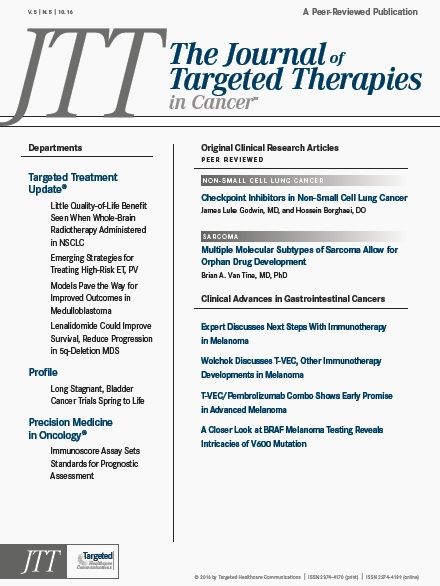Little Quality-of-Life Benefit Seen When Whole-Brain Radiotherapy Administered in NSCLC
Patients with non-small cell lung cancer whose disease has metastasized to the brain can do without whole-brain radiotherapy, according to a study published in <em>Lancet.</em>
Paula Mulvenna, MBBS
Patients with non-small cell lung cancer (NSCLC) whose disease has metastasized to the brain can do without whole-brain radiotherapy (WBRT), according to a new study published in the journalLancetand simultaneously presented at a meeting hosted by the European Respiratory Society in London.
The patientsenrolled in the Quality of Life After Treatment for Brain Metastases (QUARTZ) study—had developed widespread metastases to the brain, rendering them unsuitable for surgical resection or stereotactic radiotherapy. While, the combination of WBRT and dexamethasone is common in these patients, insight into their impact on overall survival (OS) and quality of life (QOL) had been lacking.
QUARTZ was designed as a noninferiority phase III study, which randomly assigned 538 patients to receive optimal supportive care (OSC) of dexamethasone plus WBRT (5 fractionated doses of 20 Gy daily) or OSC alone, across 69 study centers in the United Kingdom and 3 in Australia. Patient recruitment occurred between March 2, 2007, and August 29, 2014. The primary outcome measure of the trial was quality-adjusted life years (QALY), calculated using OS and the completion of a weekly questionnaire by patients (EuroQol 5 dimensions or EQ-5D).
Patients who received WBRT reported significantly more episodes of drowsiness, hair loss, nausea, and dry or itchy scalp, according to the authors; however, the rate of serious adverse events did not differ between the treatment cohorts. Additionally, the rate of OS (HR, 1.06; 95% confidence interval (CI), 0.90-1.26) and overall QOL were at par between the 2 groups of patients. The primary outcome was not very differentmean QALY was 46.4 days for the OSC plus WBRT group and 41.7 days for the OSC group.
Based on the fact that there was only a marginal difference in QALY, and OS and QOL were comparable between the 2 groups, the authors concluded in their paper that providing WBRT provides little additional clinical benefit for patients with NSCLC who have developed extensive brain metastases.
“Over time, there’s been a shift away from using whole-brain radiation in favor of radiosurgery, which has minimal side effects. Our results could further restrict [WBRT’s] use,” senior author Paula Mulvenna, MBBS, oncologist and palliative care specialist at the Newcastle Hospital’s NHS Foundation Trust, said in a statement.
An associated commentary in the same issue of the journal states that this study does not necessarily call for a complete ban on the use of WBRT, rather points to the need for developing an individualized approach for care in these patients.
Reference:
Mulvenna P, Nankivell M, Barton R, et al. Dexamethasone and supportive care with or without whole brain radiotherapy in treating patients with non-small cell lung cancer with brain metastases unsuitable for resection or stereotactic radiotherapy (QUARTZ): results from a phase 3, non-inferiority, randomised trial [published online September 5, 2016].Lancet.doi: http://dx.doi.org/10.1016/S0140-6736(16)30825-X.
Survivorship Care Promotes Evidence-Based Approaches for Quality of Life and Beyond
March 21st 2025Frank J. Penedo, PhD, explains the challenges of survivorship care for patients with cancer and how he implements programs to support patients’ emotional, physical, and practical needs.
Read More
